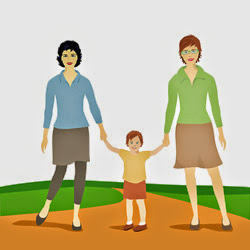
Meet Qona, the nine-year-old girl at the heart of an extraordinary tale of modern-day parenting.
Her birth mother lives in Sydney with her girlfriend. Her other mother, the woman she calls "mum" - the ex-girlfriend of her birth mother - raised her in New Zealand on her own.
But it's her gay dad who will soon take responsibility for raising her.
Qona's remarkable "rainbow" family is one of a growing trend of gay and lesbian people redefining parenthood. "We call ourselves a family," said Qona's dad, Mark Harrigan, a hairdresser from Newtown.
Jill Christie, her non-birth mother, agreed: "To her, this is normal - she knows her dad is gay and her mothers are lesbians.
"She knows she wasn't created through sex - instead we tell her she was born scientifically - and she's proud of it."
Qona Venus Harrigan Christie was conceived in Sydney through home insemination using Mr Harrigan's sperm. Ms Christie said she and Qona's birth mother, Sarah (not her real name), chose Mr Harrigan because he wanted to play a hands-on role in his child's life.
"I think if a kid has the chance to know both their mum and dad why deny them that?" she said.
"Otherwise they'll spend the rest of their lives wondering about that unknown parent."
Three weeks after Qona's birth at Royal Prince Alfred Hospital, Ms Christie obtained a parenting order from the Family Court which granted her extensive rights as co-mother.
Qona, a Solomon Islands name meaning peaceful dove, was named after Ms Christie's mother. Qona was also given Ms Christie's surname.
Mr Harrigan said his daughter's birth was the fulfilment of a lifelong dream. After Sarah gave birth, Mr Harrigan was the first person to hold the newborn. A year later - dressed in drag as "Margaret" - he held a sleeping Qona in his arms on top of the lead float in the Sydney Gay and Lesbian Mardi Gras.
"I always knew I was going to be a father - the difficulty lay in how that would happen," he said.
"Now I can't believe I produced something so beautiful."
Qona's early years were full of change. Mr Harrigan had her every third week from the age of three months till she was 4½ years, when Sarah and Ms Christie moved back to their native New Zealand.
But just a year later the lesbian couple split and Sarah returned to Sydney, leaving Ms Christie to cope as a single mother in Wellington, a conservative town with a small gay community. Suddenly alone, she had to give up her high-powered career in health administration.
"It's cost me a lot - my career, my relationships and financially," Ms Christie said.
Now 55, she has decided Mr Harrigan, 39, is more able to guide Qona through her adolescent years.
As a sperm donor, Mr Harrigan has no legal rights involving major decision-making about Qona's education, living arrangements or health. He has no liabilities either, such as child-support payments.
Last month the three parents held their first "parenting conference" and decided Qona will move back to Sydney. Ms Christie may also move in with dad and daughter, and even Sarah may play more of a role.
"With so many divorces and re-marriages it's not that extraordinary to have three parents anyway and our sexuality has nothing to do with our parenting," Mr Harrigan said.
Despite the unconventional nature of her upbringing, Qona, Ms Christie and Mr Harrigan said, is a stoic, self-assured little girl who is proud of her mums and dad.
"When I visit she drags me round the playground telling everyone I'm her dad," Mr Harrigan said.
A 2006 US study found that the adolescent offspring of same-sex parents did not differ from the children of heterosexual parents in self-esteem, peer relationships, school adjustment, drug use or sexual experience. In fact, teenagers of same-sex parents coped better with prejudice and bullying.
The other important adult in Qona's life is Mr Harrigan's partner, John Cobban.
Mr Cobban said in the past he's refused requests to be a sperm donor, believing a child "should have a male and female input into its life".
Being part of Mr Harrigan's world has changed his view.
"Meeting this unique family has opened my eyes and changed my thoughts on gay parenting," he said.
Rodney Cruise, from Gay Dads Australia, said while lesbians had been raising children for decades, gay men actively seeking fatherhood was a relatively new trend. He said gay men usually teamed up with a lesbian couple, single lesbian or single heterosexual woman. Increasingly, though, they are using a surrogate in overseas countries and raising the child with their same-sex partner.
"Gay and lesbian people will have children and you can't stop them," he said. "What makes a family is love and that's what people care about - that the kids are loved, happy and well looked after."
Mr Cruise and his partner, Jeff Chaing-Cruise, have a son Ethan, 15 months, who was born by surrogacy in the US.
He also has a child to a lesbian couple but he doesn't have a daily role in her upbringing. He said there is growing acceptance of same-sex couples in the wider community.
Qona is an outgoing, sporty child who has represented her school in athletics, swimming and cross-country. Ms Christie said she was hitting the age where "sex is on the agenda" and her parents would continue to be open about their sexuality.
Research shows children raised by same-sex parents are no more likely to identify as gay or lesbian in adulthood than children raised by heterosexual parents.
Ms Christie believes Qona will probably experiment with boys and girls as she grows up, but "she has a much chance as being gay as any other child".
[
Link:
SMH Article]
[
Link:
The Age Article]
[
Link:
Brisbane Times]






















.jpeg)
